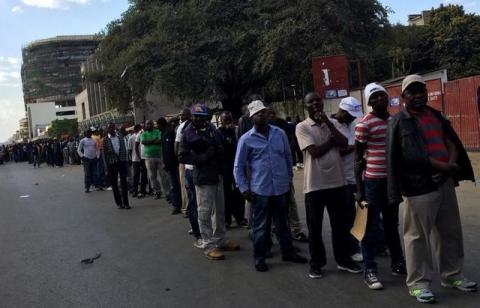Advertisement
Zambians feel pinch as election row delays moves to revive economy
LUSAKA (Reuters) - With their country in post-election disarray over allegations of vote rigging and the economy in a tailspin, Zambians like pensioner Memory Musonda are struggling to cope and fear that help will not come soon.
Depressed global commodity prices have slashed Zambia's receipts for copper, its top export, and in turn have caused a 9 percent fall in the kwacha currency against the dollar since April, exposing the economy's over-reliance on the metal.
All of this has compounded the daily woes of ordinary Zambians like Musonda, 69, a retired school teacher, already grappling with soaring food bills and power shortages caused by a searing drought.
The kwacha's plunge means Musonda's meager income cannot keep up with soaring prices for staples including sugar, milk and cooking oil mostly imported from South Africa, whose companies dominate Zambia's retail sector.
"Life is hard - prices have shot up and we are struggling to survive and it is obvious the government has no money," said Musonda. She used the bulk of her pension to buy a house, gets a monthly payout of 420 kwacha ($43) from the remainder and supplements that by renting out a room.
Consumer inflation in the southern African country of 16 million people has nearly tripled to 20 percent year-on-year from 7 percent a year ago, and unemployment has jumped to 13.3 percent, driven by mine closures.
Downtown Lusaka bears testimony to increasing economic hardship. Makeshift stalls line most streets as residents try to eke out a living selling anything from traditional medicine to imported second-hand underwear.
About 54 percent of the population in Zambia were found to be living in poverty in 2015, according to Central Statistical Office data released in April.
Zambians see no clear or easy way out of their plight.
Any aid from global lenders such as the International Monetary Fund is likely to have painful austerity terms attached.
China has invested heavily in modernizing Zambia's infrastructure, especially roads and water supply systems. But many Zambians accuse China of poor work-site safety standards, paying poor wages and muscling out local firms from infrastructure projects - complaints echoed in other African states where Beijing has a major economic footprint.
Chinese companies in Zambia have said that they operate within the country’s labor laws.
IMF OR CHINESE AID?
"We need help, but an IMF program will probably come with conditions such as the removal of fuel subsidies; on the other hand, it always takes time for the benefits of Chinese investments to trickle down," said Musonda.
Economists say that the IMF talks are more likely to bear fruit faster than seeking Chinese help.
But Zambians have been wary of IMF aid since the global lender imposed austerity in the 1980s in exchange for bailing Africa's No. 2 copper producer out of another debt crisis. That led to a surge in food prices, which triggered riots.
"We have been on such a program before and still remember the hardships it brought," said Bruce Phiri, a 45-year-old artisan who repairs damaged pumps for a living.
"I have to fight hard to put food on the table for my family and my fear is that things will be worse when the IMF comes in. The Chinese also come with conditions," he said.
Lubinda Habazoka, an economist at Zambia's Copperbelt University, said Chinese financing often came on condition that Chinese firms were given an infrastructure contract. This meant that Zambian firms lacking the resources to run such projects on their own were being elbowed aside.
ELECTION WRANGLE
Prospects for resuming critical budget support talks with the IMF have been dimmed by delays in swearing in a new head of state, after opposition leader Hakainde Hichilema challenged President Edgar Lungu's Aug. 11 re-election in court.
The election row - which followed violence between rival campaign supporters in what is otherwise considered one of Africa's most stable democracies - could damage Zambia's ability to attract investment critical to reviving the economy.
Moody's downgraded Lusaka's rating to B3 with a negative outlook in April, saying its credit metrics had deteriorated more than expected since another cut in September last year, and the negative trend would likely continue for at least 2 years.
That's bad news for a country which needs to borrow more to service an external debt of around $5 billion, more than 18 percent of GDP. The domestic debt burden is close to $4 billion, about 14 percent of GDP, according to the finance ministry.
"The prospect of a legal and political crisis is likely to weigh on investor sentiment in the next few months, which could lead to a further depreciation of the kwacha and a rise in yields on Zambia’s eurobonds," Capital Economics analyst Liam Carson said.
(Additional reporting by Chris Mfula; editing by James Macharia and Mark Heinric



















Add new comment